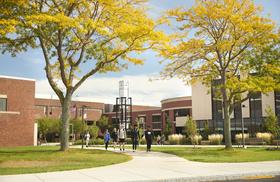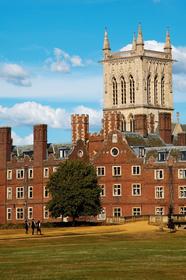Community college is the only option for many students who either can’t afford a traditional four-year university or who need a more flexible school environment. Just because community college is different, however, doesn’t mean that its students matter any less. The Aspen Prize exists to encourage community colleges to do more for their students and to continually strive for improvement.
For many years, community colleges had a reputation for being a lesser version of traditional 4-year colleges and universities. It was common for community colleges to offer a smattering of courses at affordable tuition rates, but many were found lacking when it came to helping students complete a degree or transfer to an accredited university.
The Aspen Prize was developed to reward community colleges that go the extra mile toward help their students complete degrees and experience success after graduation. The organization that awards the prize assesses how well institutes perform in four different areas. The award is given every two years and the recipients should be viewed as examples for other community colleges to follow if they hope to do what is best for their students.
In this article, we’ll explore the history of the Aspen Prize and how it was developed. We’ll also take a closer look at this year’s recipients to determine what other community colleges can do to follow their example of commitment to student success, both in college and after graduating.
What is the Aspen Prize?
The Aspen Prize for Community College Excellence is awarded every two years and it is the United States’ signature recognition of performance and high achievement among the nation’s community colleges. Community colleges have always been more affordable and accessible than the nation’s top universities, but within the last decade there has been a new focus on seeing more community college students complete their education and move on toward high-wage career opportunities.
According to The Aspen Institute, the organization behind the prize, improving the nation’s community college student success is vital. The organization focuses on student success, awarding models that actually work. In this way, the prize seeks to:
- Identify and celebrate excellence
- Coalesce around a clear definition of student success
- Stimulate replication of exceptional practice
The community college sector of higher education has long been under-recognized, so the Aspen Prize works to elevate and recognize those institutions that have become models of excellence. The prize itself is four-part, evaluating student success by various factors related to learning, graduating, and securing good jobs. By identifying the schools that meet these standards, the prize aims to encourage other community colleges to adopt similar strategies and methods for ensuring student success.
How is the Aspen Prize Awarded?
The Aspen Prize has been awarded every two years since it began in 2011. The award itself comes with a $1 million prize and comes at the end of a two-year process in which the College Excellence Program assesses student outcomes at more than 1,000 United States community colleges. Over the course of those two years, the program selects ten finalists and, ultimately, a single winner.
Institutions deemed eligible for the Aspen Prize are assessed for exceptional student outcomes in four specific areas:
- Student learning
- Certificate and degree completion
- Employment and earnings
- High levels of success for minority and low-income students
To assess each school in these categories, the program reviews data, speaks with community college leaders, and seeks guidance from experts in higher education. The process itself is comprised of three different rounds.
In Round 1, Aspen relies on guidance from an expert Data/Metrics Advisory Panel while working with the National Center for Higher Education Management Systems (NCHEMS) to review nationally available data on institutional performance, improvement, and equality in areas such as student retention and completion rates. They narrow down the list of nearly 1,000 community colleges in the nation to 150 that are determined eligible for the prize.
After determining the 150 eligible institutions, Aspen invites each to submit an application that will be reviewed by a selection committee of higher education experts. Using the data reflected in Round 1 and the additional qualitative and quantitative information provided in each application, Aspen selects 10 institutions as finalists for the prize.
In the third round, Aspen puts together a small team of experts in community college practice, research, and leadership to conduct 1.5-day site visits at each of the 10 finalist institutions. As part of the review, Aspen collects additional information on learning assessment practices and employment and earning outcomes to determine the winner. Again, this three-round process takes two years to complete.
Here is a list of past winners of the Aspen Prize:
- Valencia College (2011)
- Walla Walla Community College & Santa Barbara City College (2013)
- Santa Fe College (2015)
- Lake Area Technical Institute (2017)
As you can see, Florida has a history of winning the Aspen Prize. It was first awarded to Valencia Community College in Orlando in 2011 and the third was given to Santa Fe College in Gainesville. In 2019, Broward College in Fort Lauderdale was a finalist.
Aspen Prize Winners for 2019
In 2013, two community colleges were named co-winners of the Aspen Prize. In 2019, two institutions are again named winners, and both are from Florida. Indian River State College and Miami Dade College share the title of winning the 2019 Aspen Prize for Community College Excellence. Each received $350,000 and the finalists were awarded $100,000 each.
According to Lenore Rodicio, executive vice president and provost of Miami Dade College, it really came down to the community colleges that focus “not only on what students do while enrolled, but also on ensuring they succeed in the work force or at a four-year institution.”
Joshua Wyner, executive director of the Aspen Prize program, is very optimistic about the future of community college education. The award recognizes community colleges for their accessibility, completion rate, and student success after graduation. Both Indian River State and Miami Dade colleges were chosen because, according to Wyner, they “created clear, guided pathways for students with strong advising from staff members.” Rather than simply offering a smattering of courses students could choose from, they offer a curriculum that transfers well.
What Can Other Colleges Learn from Them?
Though it may seem like one community college may be like any other, that is not the case. The Aspen Prize is proof that some community colleges go above and beyond to create a student experience that lasts far beyond graduation. But what can other community colleges learn from this year’s winners?
Indian River State College is located in Fort Pierce, Florida, about 60 miles from the closest four-year institution. By taking the bold step to offer bachelor’s degrees in addition to their associate degree programs, the college now boasts the highest completion rate of any finalist for the Aspen Prize and graduates as many students with bachelor’s degree as the nearest four-year school. Both their graduation and transfer rates are also well above the national average, sitting around 50%
According to Andrew Treadwell, administrative director of legislative and executive communication at Indian River State College, the changes began about 20 years ago. The school was a finalist for the Aspen Prize in 2015 and a finalist with distinction in 2017. These awards are testament to the fact that the school continues to strive for improvement.
Miami Dade College was also a second-time finalist. Serving more than 100,000 students and more minority students than any other college in the country, Miami Dade’s award is particularly impressive because, according to Wyner, “the larger a college is, the harder it is to succeed.”
Wyner reports that the college’s holistic approach to the student experience was a major determining factor in receiving the award. The college offers students certain benefits like tax preparation, transportation vouchers, and other nonacademic benefits that allow them to spend more time studying and less time working from the moment they first enroll to their graduation or transfer date. The school has even partnered with established four-year institutions to provide their students with guaranteed transfer after two years.
Though there are many colleges who should be recognized for their work in improving student success, says Wyner, there are just as many who haven’t taken those steps. If community colleges want to survive and thrive in the coming years, they need to follow in the footsteps of past and present Aspen Prize winners in creating an experience that benefits the students as well as the college.















